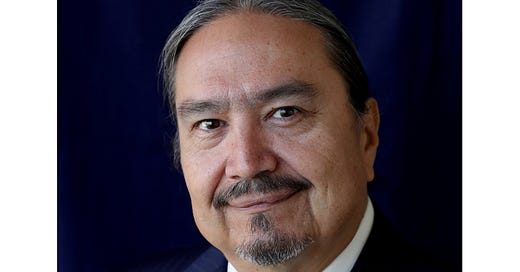Meet the Candidate: Bruce Whalen
Whalen one of two Republicans looking to unseat Democrat in Senate seat
Bruce Whalen is one of two Republicans running for the South Dakota state Senate in District 27, along with Anthony Kathol. Whalen previously ran unsuccessfully for the U.S. Senate in 2022.
The district picks up east of Box Elder, and includes landmarks such as Badlands National Park and the Pine Ridge reservation. Other communities in the district include Martin and New Underwood.
The Dakota Scout sent a series of questions to all legislative candidates running in contested races for the state House and Senate in the June 4 primary election. Candidates were asked to limit their responses to each question to 150 words or less.
Age: 62
City of residence: Pine Ridge Village, Pine Ridge Indian Reservation
Profession: Education
Public service/community service experience: I was involved with youth sports or organized fundraising for youth activities since returning to the Pine Ridge Indian Reservation 25 years ago. I interned with university researchers who studied the Pine Ridge Indian Reservation seeking to describe evidence of economic development beyond the footprint of federal oversight. I voluntarily assisted any person to navigate tribal, state and federal offices seeking “redress of government.” I am happiest by mentoring emerging adults (teenagers) to cope with government graft and corruption resulting in the most mismanaged communities developed by statute through the United States Congress.
Family information: Married to Carol E.H. Whalen. We have five children together. One son is in college. One daughter is in college. Next year our youngest son will be a high school senior. Two children, Ruthie and Enoch are with Jesus. From a previous marriage, my oldest son is married and has five children.
1) What's the government's role in facilitating economic development in South Dakota?
The State Constitution appears to be 103 pages, loosely interlocked, that three Branches of state government have yet to discover “checks and balances” to prevent trespassing against the Bill of Rights of its citizens.
The State’s Uniform Commercial Code is designed to “promote uniformity among various filing jurisdictions” and “commercial transactions basically involve[ing] the sale of and purchase of goods.” Title 47, CORPORATIONS, is a regulatory behemoth. Not to mention the slew of federal laws dictating to States.
South Dakota must be more concerned about the rights of its citizens rather than profit of any corporation or federal act. With the Bill of Rights, keep in mind, government should not stifle innovation, compete with, politically threaten production, unduly regulate, tax, burden with red tape or prevent South Dakotan ability.
The South Dakota Government did more to reduce main streets across municipalities than help and is now a welfare state.
2) If you could have dinner with any person, dead or alive, who would it be and why?
I have two people from the Bible in mind to have dinner with: John the Baptist and Daniel, whose name means “God is my Judge.” I chose Daniel.
Nebuchadnezzar, a murderous Babylonian king, captured Israel about 605 B.C., including Daniel who was a Jewish teenager of royal bloodline. The God of Abraham, Issac and Jacob chose Daniel to communicate with angels, to serve a murderous king, and to protect Nebuchadnezzar’s kingdom during his seven years of delusions and eating grass. Daniel interpreted the dreams of Nebuchadnezzar and foretold about subsequent kingdoms throughout the ages up to the final Antichrist.
Daniel was given rulership over Babylon under only Nebuchadnezzar. Daniel’s attitude and convictions in serving God were extraordinary even when it meant disobeying Nebuchadnezzar. Scholars believe that before Nebuchadnezzar’s death, he became faithful by the grace of God and towards Daniel he became a brother in faith.
3) Does the "Landowner Bill of Rights" -- adopted by the Legislature amid opposition to carbon pipeline companies using eminent domain -- strike the right balance between the interests of property owners, counties and the ag industry - and should voters get a say when they head to the polls in November?
The South Dakota government did very little, and continues to do nothing about, trespasses against Election Chain of Custody and forced citizens to defend themselves by using the broken system to overturn yet another crony-legislation favoring corporations and other states beyond South Dakota’s boundaries during a crucial time when at least Two Branches of state government and former RINO Chairman and SDGOP officers are seemly intimate with corporations.
It doesn’t settle with me to make it sound like South Dakota “voters” are getting a say after two Branches of government utterly deceived and failed us. What does it take to protect South Dakota against eminent domain, including that by KXL during prior years?
Isn’t it enough that Article III, Legislative Department, Sec. 23 or Article XVII, Corporations, are not exhaustively debated well beyond the exhaustion of cashing a check at a bank by those selling South Dakota to highest bidders?


















